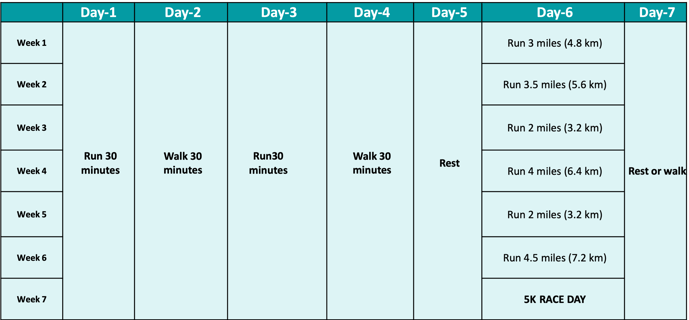
Benefits of Cardio (Aerobic exercise):
Heart:
Lowers blood pressure and heart rate.
Improves cholesterol levels.
Brain:
Increases blood flow.
May reduce dementia risk.
Enhances memory and thinking.
Joints:
Fights osteoporosis.
Helps manage arthritis discomfort.
Digestion:
Speeds up food movement.
Regulates blood sugar.
Supports gut health.
Muscles:
Improves muscle efficiency.
Allows easier daily activities.
Skin:
Enhances circulation for better complexion.
Reduces stress-related skin conditions.
Lungs:
Reduces shortness of breath.
Benefits those with lung issues like asthma.
Additional Benefits:
Aids in weight loss.
Boosts energy.
Improves sleep quality.
Strengthens the immune system.
Reduces the risk of falling.
Enhances sexual function.
Elevates mood and reduces stress.

5K Run Training Schedule for Beginners:


Tips to help you get the most out of your aerobic exercises:
Consult Your Doctor: If you're new to exercise or have any underlying health conditions, it's a good idea to consult your healthcare provider before starting a new aerobic exercise routine.
Start Slowly: If you're a beginner, begin with low-intensity exercises and gradually increase the intensity and duration as your fitness level improves.
Warm-Up: Always start with a warm-up to prepare your muscles and prevent injury. Five to ten minutes of light aerobic activity like brisk walking or jogging in place can suffice.
Proper Form: Maintain proper form and posture during your chosen aerobic activity to prevent strain and injury. If you're unsure, consider working with a fitness trainer.
Breathing: Focus on your breathing. Inhale deeply through your nose and exhale through your mouth. Don't hold your breath; rhythmic breathing is essential.
Hydrate: Drink plenty of water before, during, and after your workout to stay hydrated. Dehydration can negatively impact your performance and health.
Wear Appropriate Footwear: Ensure you have comfortable and supportive shoes suitable for your chosen aerobic activity. Ill-fitting shoes can lead to discomfort and injuries.
Cool Down: After your workout, spend a few minutes cooling down with gentle stretching to reduce muscle soreness and promote flexibility.
Listen to Your Body: Pay attention to how your body feels. If you experience pain, dizziness, shortness of breath, or any concerning symptoms, stop exercising and seek medical advice if necessary.
Variety: Change up your aerobic activities to prevent boredom and work different muscle groups. For example, alternate between running, cycling, swimming, and dancing.
Set Goals: Establish clear goals for your aerobic workouts. Whether it's improving endurance, losing weight, or achieving specific fitness milestones, having goals can keep you motivated.
Consistency: Aim for regular aerobic exercise. Consistency is key to seeing long-term health benefits.
Mix Intensity: Include both moderate-intensity and high-intensity aerobic workouts in your routine. High-intensity interval training (HIIT) can be particularly effective for improving cardiovascular fitness.
Use Music: Many people find that music with a fast tempo can help boost motivation and make aerobic exercise more enjoyable.
Socialize: Consider joining group classes or finding a workout buddy. Exercising with others can provide motivation and make the experience more enjoyable.
Track Progress: Keep a workout journal or use fitness tracking apps to monitor your progress and stay motivated.
Rest: Allow your body to recover between intense workouts. Rest is essential for preventing overtraining and reducing the risk of injury.
Nutrition: Eat a balanced diet to fuel your workouts. Incorporate carbohydrates for energy, lean protein for muscle repair, and healthy fats for overall health.
Remember that aerobic exercise is just one component of a healthy lifestyle. Combine it with a well-rounded diet, strength training, flexibility exercises, and adequate rest for optimal results and overall well-being.




